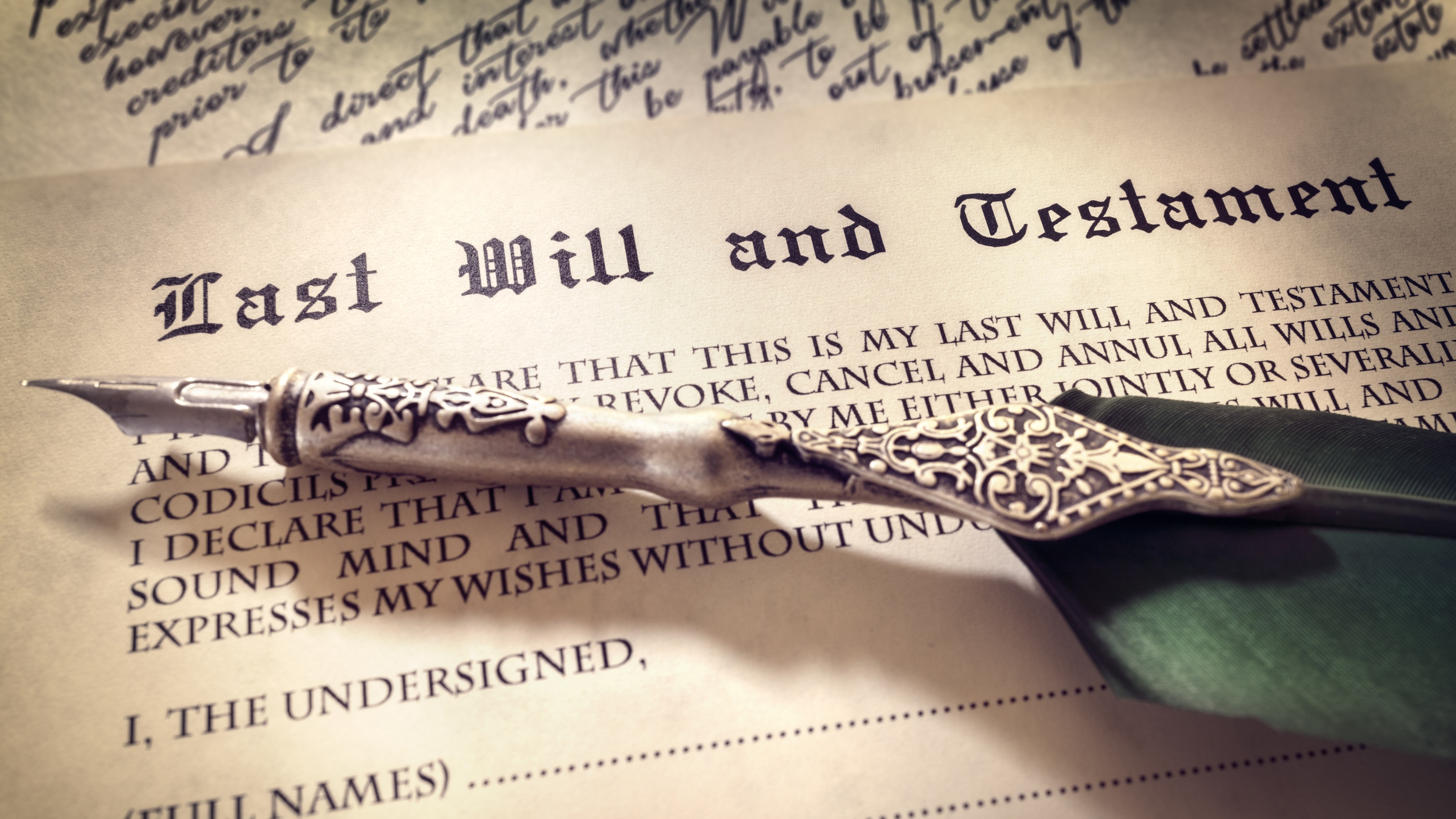Where There's a Will, There's a Way Your Assets Will Be Distributed as You Wish
Your will is the backbone of a strong, adaptable estate plan that ensures what you leave behind goes to your selected beneficiaries. Without a will, state laws determine who gets your assets.


Profit and prosper with the best of Kiplinger's advice on investing, taxes, retirement, personal finance and much more. Delivered daily. Enter your email in the box and click Sign Me Up.
You are now subscribed
Your newsletter sign-up was successful
Want to add more newsletters?

Delivered daily
Kiplinger Today
Profit and prosper with the best of Kiplinger's advice on investing, taxes, retirement, personal finance and much more delivered daily. Smart money moves start here.

Sent five days a week
Kiplinger A Step Ahead
Get practical help to make better financial decisions in your everyday life, from spending to savings on top deals.

Delivered daily
Kiplinger Closing Bell
Get today's biggest financial and investing headlines delivered to your inbox every day the U.S. stock market is open.

Sent twice a week
Kiplinger Adviser Intel
Financial pros across the country share best practices and fresh tactics to preserve and grow your wealth.

Delivered weekly
Kiplinger Tax Tips
Trim your federal and state tax bills with practical tax-planning and tax-cutting strategies.

Sent twice a week
Kiplinger Retirement Tips
Your twice-a-week guide to planning and enjoying a financially secure and richly rewarding retirement

Sent bimonthly.
Kiplinger Adviser Angle
Insights for advisers, wealth managers and other financial professionals.

Sent twice a week
Kiplinger Investing Weekly
Your twice-a-week roundup of promising stocks, funds, companies and industries you should consider, ones you should avoid, and why.

Sent weekly for six weeks
Kiplinger Invest for Retirement
Your step-by-step six-part series on how to invest for retirement, from devising a successful strategy to exactly which investments to choose.
Life rarely stays the same, and neither should your estate plan.
Major life events often require changes to your estate planning documents. We often tell clients to remember the five D's: dependents, divorce, downsizing, disability and death.
Any of these events can quickly make an estate plan outdated, which is why a one-size-fits-all will isn't enough. In this article, we'll take a closer look at the backbone of any good plan — your will.
From just $107.88 $24.99 for Kiplinger Personal Finance
Become a smarter, better informed investor. Subscribe from just $107.88 $24.99, plus get up to 4 Special Issues

Sign up for Kiplinger’s Free Newsletters
Profit and prosper with the best of expert advice on investing, taxes, retirement, personal finance and more - straight to your e-mail.
Profit and prosper with the best of expert advice - straight to your e-mail.
Kiplinger's Adviser Intel, formerly known as Building Wealth, is a curated network of trusted financial professionals who share expert insights on wealth building and preservation. Contributors, including fiduciary financial planners, wealth managers, CEOs and attorneys, provide actionable advice about retirement planning, estate planning, tax strategies and more. Experts are invited to contribute and do not pay to be included, so you can trust their advice is honest and valuable.
What is a will?
A will is a legal document that instructs your personal representative (also known as an executor) on how your affairs should be handled upon your passing.
It can be as simple as directing where certain assets should go or more involved, such as nominating a conservator and guardian for your minor children and holding assets in trust for their benefit.
What does your will distribute?
A will distributes your probate assets — items you own in your name alone, with no beneficiary designated. Common examples include a vehicle, personal property or a bank account without a pay-on-death or transfer-on-death designation.
Assets with beneficiary designations — such as checking accounts, savings accounts, brokerage accounts, retirement accounts and insurance policies — pass outside of your will.
If you've ever named a beneficiary for one of these accounts, congratulations: You are an estate planner.
Assets such as checking and savings accounts, CDs and brokerage accounts that are held jointly in your name with another person will, in most cases, pass as a matter of law to the surviving joint owner without being subject to your will.
How does a will distribute your assets?
Let's look at a basic example. John Smith has one checking account with $10,000, one savings account with $5,000, one car and one house. He names his two adult children, Susan and Mark, as beneficiaries on the checking account. His will states that the car should go to Mark, the house to Susan, and everything else should be split equally.
When John passes away, his checking account bypasses the will because he completed the beneficiary designation. Those funds will pass equally to Susan and Mark.
His probate assets — the savings account, car and house — will be distributed according to his will. That means Mark will receive the car and $2,500 from the savings account. Similarly, Susan will receive $2,500 from the savings account and the house.
The total assets distributed to Mark will include $5,000 from the checking account, the car and $2,500 from the savings account. The total assets being distributed to Susan will include $5,000 from the checking account, the house and $2,500 from the savings account.
What happens if you don't have a will?
If you die without a will, you're considered to have died intestate, in which case, state laws determine who gets your assets.
Statutes vary from state to state, but most consider several factors, such as whether you were married, had children, if your spouse was also the parent of your children or if you have living parents or siblings.
If no close family members are found, the law might consider distant cousins.
Looking for expert tips to grow and preserve your wealth? Sign up for Adviser Intel (formerly known as Building Wealth), our free, twice-weekly newsletter.
Dying without a will could not only make your assets go to people you never intended to benefit, but it will also make settling your estate more time-consuming and costly.
For example, both John Denver and Prince died intestate. Denver's estate took six years to settle. Prince's took just as long, draining tens of millions of dollars from the singer's $156 million estate.
Having a will allows you to direct who receives your assets in a timely, cost-efficient manner.
Who is in charge of making sure your will is probated?
Your will names a personal representative — or executor — to manage your estate. This person acts as a fiduciary and is in charge of identifying assets of the estate, paying any valid creditor claims, filing any tax returns (income or estate) that might be required and carrying out tasks related to the administration of the estate, including distributing probate assets according to the terms of the will.
Your choice of personal representative might change over time. Younger individuals typically name a parent, spouse or another close relative or friend. Older individuals typically name a spouse, child or sibling.
The key is to choose someone you trust to carry out your wishes and to revisit your choices periodically. I always recommend choosing an alternate to serve as a personal representative if the primary choice is unable to serve for any reason (for example, incapacity, death or refusal).
If these roles aren't filled, additional time will be required to find someone to be appointed to these positions, and with additional time comes additional legal fees.
You can also nominate a guardian and conservator for your minor children. They would raise your children and manage their finances, respectively, if you were to pass away while they're still minors.
Anyone can serve in either of these roles; however, it's important to have a conversation with any individual nominated. I always suggest that you name an alternate choice in case your first choice is unavailable.
How you can prepare
With the introduction of artificial intelligence and several online platforms, many people wonder if they even need an estate planning attorney. The answer is an unequivocal yes.
Online estate planning services are growing in popularity due to their low cost and convenience. However, wills are technical documents, and specific statutory and legal requirements must be met to be valid and enforceable.
Working with an attorney who is licensed in your state might cost more upfront, but it ensures that your will is legally sound and enforceable.
There are several resources to help you find an attorney. Call your city, county and state bar associations, and they can provide you with a list of attorneys who focus on estate planning.
Additionally, if you have a financial adviser, either independently or through your place of employment, they might recommend an estate planning attorney who can assist you.
Lastly, many community centers, senior centers and local nonprofit organizations will have estate planning presentations and seminars, typically open to the public and often free of charge.
This affords you the opportunity to learn more about estate planning while meeting an estate planning attorney who might be able to help you.
Before your first meeting
Once you've chosen an estate planning attorney, here are some things to consider before your first meeting:
Compile a list of your assets, both tangible and intangible.
If you have assets that allow for beneficiary designations, confirm what the current beneficiary designations are.
Think about whom you would like to serve as your personal representative and guardian/conservator of your minor children. Have a conversation with them to make sure they're willing to serve in such a capacity.
Think about how you'd like your assets distributed upon your passing and how you'd like those assets distributed if your first choice is not available.
Think about any charitable distributions you might like to make. Generally, we recommend these distributions be made with a beneficiary designation, but many individuals prefer to include charitable distributions in their wills.
If you have prior estate planning documents, think about how you'd like those to change when compared with your new estate planning documents. Bring those documents so your attorney can review them and let you know if they need to be modified or revoked.
Are you a beneficiary of another person's estate plan, for example, the beneficiary of a parent's or grandparent's trust? If so, let your attorney know, as this might affect how you structure your own estate plan.
In conclusion
With this information, you and your estate planning attorney can build a plan that accomplishes your goals, as well as let you know about any potential issues that could arise.
Taking the time to make the proper arrangements now — and making timely updates when life brings you one of the five D's — will give you the peace of mind that comes with knowing your wishes will be honored and your legacy preserved.
Related Content
- I'm an Estate Planning Attorney: These Are the Two Legal Documents Everyone Should Have
- How to Choose Your Trustee or Executor of Your Will
- Probate: The Terrible, Horrible, No Good, Very Bad Side of Estate Planning
- Wills Gone Wild: How to Avoid Estate Planning Disasters
- 10 Good Reasons to Revisit Your Will
Profit and prosper with the best of Kiplinger's advice on investing, taxes, retirement, personal finance and much more. Delivered daily. Enter your email in the box and click Sign Me Up.

Jared has been with Mirick's Trusts and Estates Group since May 2022. He concentrates his practice on estate planning, estate and trust administration and probate litigation matters. Jared counsels individuals and families on developing and implementing estate plans designed to increase, maintain and transfer wealth in accordance with each client's unique needs and wishes. He prepares a range of estate and tax planning instruments, including wills, trusts, durable powers of attorney and health care proxies.
-
 Quiz: Do You Know How to Avoid the "Medigap Trap?"
Quiz: Do You Know How to Avoid the "Medigap Trap?"Quiz Test your basic knowledge of the "Medigap Trap" in our quick quiz.
-
 5 Top Tax-Efficient Mutual Funds for Smarter Investing
5 Top Tax-Efficient Mutual Funds for Smarter InvestingMutual funds are many things, but "tax-friendly" usually isn't one of them. These are the exceptions.
-
 AI Sparks Existential Crisis for Software Stocks
AI Sparks Existential Crisis for Software StocksThe Kiplinger Letter Fears that SaaS subscription software could be rendered obsolete by artificial intelligence make investors jittery.
-
 Quiz: Do You Know How to Avoid the 'Medigap Trap?'
Quiz: Do You Know How to Avoid the 'Medigap Trap?'Quiz Test your basic knowledge of the "Medigap Trap" in our quick quiz.
-
 5 Top Tax-Efficient Mutual Funds for Smarter Investing
5 Top Tax-Efficient Mutual Funds for Smarter InvestingMutual funds are many things, but "tax-friendly" usually isn't one of them. These are the exceptions.
-
 Why Invest In Mutual Funds When ETFs Exist?
Why Invest In Mutual Funds When ETFs Exist?Exchange-traded funds are cheaper, more tax-efficient and more flexible. But don't put mutual funds out to pasture quite yet.
-
 We Retired at 62 With $6.1 Million. My Wife Wants to Make Large Donations, but I Want to Travel and Buy a Lake House.
We Retired at 62 With $6.1 Million. My Wife Wants to Make Large Donations, but I Want to Travel and Buy a Lake House.We are 62 and finally retired after decades of hard work. I see the lakehouse as an investment in our happiness.
-
 Social Security Break-Even Math Is Helpful, But Don't Let It Dictate When You'll File
Social Security Break-Even Math Is Helpful, But Don't Let It Dictate When You'll FileYour Social Security break-even age tells you how long you'd need to live for delaying to pay off, but shouldn't be the sole basis for deciding when to claim.
-
 I'm an Opportunity Zone Pro: This Is How to Deliver Roth-Like Tax-Free Growth (Without Contribution Limits)
I'm an Opportunity Zone Pro: This Is How to Deliver Roth-Like Tax-Free Growth (Without Contribution Limits)Investors who combine Roth IRAs, the gold standard of tax-free savings, with qualified opportunity funds could enjoy decades of tax-free growth.
-
 One of the Most Powerful Wealth-Building Moves a Woman Can Make: A Midcareer Pivot
One of the Most Powerful Wealth-Building Moves a Woman Can Make: A Midcareer PivotIf it feels like you can't sustain what you're doing for the next 20 years, it's time for an honest look at what's draining you and what energizes you.
-
 Stocks Make More Big Up and Down Moves: Stock Market Today
Stocks Make More Big Up and Down Moves: Stock Market TodayThe impact of revolutionary technology has replaced world-changing trade policy as the major variable for markets, with mixed results for sectors and stocks.